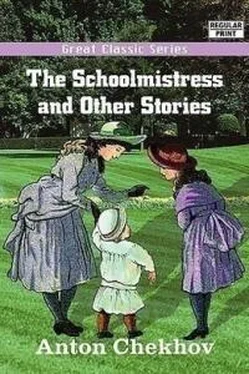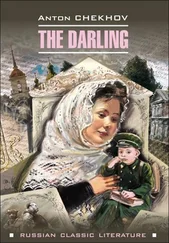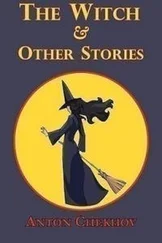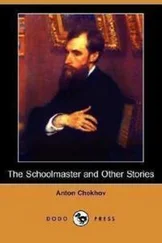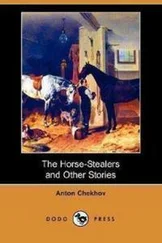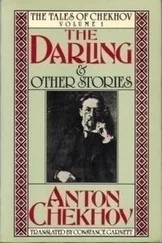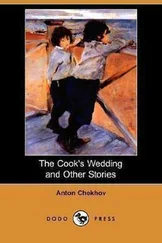The old man spends his time from morning till night going about looking for purchasers, and Yasha sits for days in the hotel room, or goes out into the street to look at the town. He sees the filthy square heaped up with dung, the signboards of restaurants, the turreted walls of a monastery in the fog. Sometimes he runs across the street and looks into the grocer's shop, admires the jars of cakes of different colors, yawns, and lazily saunters back to his room. The city does not interest him.
At last the bullocks are sold to a dealer. Malahin hires drovers. The cattle are divided into herds, ten in each, and driven to the other end of the town. The bullocks, exhausted, go with drooping heads through the noisy streets, and look indifferently at what they see for the first and last time in their lives. The tattered drovers walk after them, their heads drooping too. They are bored…. Now and then some drover starts out of his brooding, remembers that there are cattle in front of him intrusted to his charge, and to show that he is doing his duty brings a stick down full swing on a bullock's back. The bullock staggers with the pain, runs forward a dozen paces, and looks about him as though he were ashamed at being beaten before people.
After selling the bullocks and buying for his family presents such as they could perfectly well have bought at home, Malahin and Yasha get ready for their journey back. Three hours before the train goes the old man, who has already had a drop too much with the purchaser and so is fussy, goes down with Yasha to the restaurant and sits down to drink tea. Like all provincials, he cannot eat and drink alone: he must have company as fussy and as fond of sedate conversation as himself.
"Call the host!" he says to the waiter; "tell him I should like to entertain him."
The hotel–keeper, a well–fed man, absolutely indifferent to his lodgers, comes and sits down to the table.
"Well, we have sold our stock," Malahin says, laughing. "I have swapped my goat for a hawk. Why, when we set off the price of meat was three roubles ninety kopecks, but when we arrived it had dropped to three roubles twenty–five. They tell us we are too late, we should have been here three days earlier, for now there is not the same demand for meat, St. Philip's fast has come…. Eh? It's a nice how–do–you–do! It meant a loss of fourteen roubles on each bullock. Yes. But only think what it costs to bring the stock! Fifteen roubles carriage, and you must put down six roubles for each bullock, tips, bribes, drinks, and one thing and another…."
The hotel–keeper listens out of politeness and reluctantly drinks tea. Malahin sighs and groans, gesticulates, jests about his ill–luck, but everything shows that the loss he has sustained does not trouble him much. He doesn't mind whether he has lost or gained as long as he has listeners, has something to make a fuss about, and is not late for his train.
An hour later Malahin and Yasha, laden with bags and boxes, go downstairs from the hotel room to the front door to get into a sledge and drive to the station. They are seen off by the hotel–keeper, the waiter, and various women. The old man is touched. He thrusts ten–kopeck pieces in all directions, and says in a sing–song voice:
"Good by, good health to you! God grant that all may be well with you. Please God if we are alive and well we shall come again in Lent. Good–by. Thank you. God bless you!"
Getting into the sledge, the old man spends a long time crossing himself in the direction in which the monastery walls make a patch of darkness in the fog. Yasha sits beside him on the very edge of the seat with his legs hanging over the side. His face as before shows no sign of emotion and expresses neither boredom nor desire. He is not glad that he is going home, nor sorry that he has not had time to see the sights of the city.
"Drive on!"
The cabman whips up the horse and, turning round, begins swearing at the heavy and cumbersome luggage.
THE turner, Grigory Petrov, who had been known for years past as a splendid craftsman, and at the same time as the most senseless peasant in the Galtchinskoy district, was taking his old woman to the hospital. He had to drive over twenty miles, and it was an awful road. A government post driver could hardly have coped with it, much less an incompetent sluggard like Grigory. A cutting cold wind was blowing straight in his face. Clouds of snowflakes were whirling round and round in all directions, so that one could not tell whether the snow was falling from the sky or rising from the earth. The fields, the telegraph posts, and the forest could not be seen for the fog of snow. And when a particularly violent gust of wind swooped down on Grigory, even the yoke above the horse's head could not be seen. The wretched, feeble little nag crawled slowly along. It took all its strength to drag its legs out of the snow and to tug with its head. The turner was in a hurry. He kept restlessly hopping up and down on the front seat and lashing the horse's back.
"Don't cry, Matryona,…" he muttered. "Have a little patience. Please God we shall reach the hospital, and in a trice it will be the right thing for you…. Pavel Ivanitch will give you some little drops, or tell them to bleed you; or maybe his honor will be pleased to rub you with some sort of spirit—it'll…draw it out of your side. Pavel Ivanitch will do his best. He will shout and stamp about, but he will do his best…. He is a nice gentleman, affable, God give him health! As soon as we get there he will dart out of his room and will begin calling me names. 'How? Why so?' he will cry. 'Why did you not come at the right time? I am not a dog to be hanging about waiting on you devils all day. Why did you not come in the morning? Go away! Get out of my sight. Come again to–morrow.' And I shall say: 'Mr. Doctor! Pavel Ivanitch! Your honor!' Get on, do! plague take you, you devil! Get on!"
The turner lashed his nag, and without looking at the old woman went on muttering to himself:
"'Your honor! It's true as before God…. Here's the Cross for you, I set off almost before it was light. How could I be here in time if the Lord…. The Mother of God…is wroth, and has sent such a snowstorm? Kindly look for yourself…. Even a first–rate horse could not do it, while mine—you can see for yourself—is not a horse but a disgrace.' And Pavel Ivanitch will frown and shout: 'We know you! You always find some excuse! Especially you, Grishka; I know you of old! I'll be bound you have stopped at half a dozen taverns!' And I shall say: 'Your honor! am I a criminal or a heathen? My old woman is giving up her soul to God, she is dying, and am I going to run from tavern to tavern! What an idea, upon my word! Plague take them, the taverns!' Then Pavel Ivanitch will order you to be taken into the hospital, and I shall fall at his feet…. 'Pavel Ivanitch! Your honor, we thank you most humbly! Forgive us fools and anathemas, don't be hard on us peasants! We deserve a good kicking, while you graciously put yourself out and mess your feet in the snow!' And Pavel Ivanitch will give me a look as though he would like to hit me, and will say: 'You'd much better not be swilling vodka, you fool, but taking pity on your old woman instead of falling at my feet. You want a thrashing!' 'You are right there—a thrashing, Pavel Ivanitch, strike me God! But how can we help bowing down at your feet if you are our benefactor, and a real father to us? Your honor! I give you my word,…here as before God,…you may spit in my face if I deceive you: as soon as my Matryona, this same here, is well again and restored to her natural condition, I'll make anything for your honor that you would like to order! A cigarette–case, if you like, of the best birchwood,…balls for croquet, skittles of the most foreign pattern I can turn…. I will make anything for you! I won't take a farthing from you. In Moscow they would charge you four roubles for such a cigarette–case, but I won't take a farthing.' The doctor will laugh and say: 'Oh, all right, all right…. I see! But it's a pity you are a drunkard….' I know how to manage the gentry, old girl. There isn't a gentleman I couldn't talk to. Only God grant we don't get off the road. Oh, how it is blowing! One's eyes are full of snow."
Читать дальше
